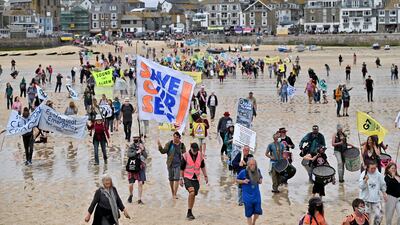The UK government has denied the G7 summit caused a “tsunami of Covid-19 cases" in south-west England.
Infection rates have risen rapidly in Cornwall, where the three-day gathering of world leaders was held, increasing from 4.9 for every 100,000 people on June 3 to 130.6 for every 100,000 people on June 16.
The summit, held from June 11 to 13, took place in Carbis Bay but international media and other delegates stayed in surrounding towns such as Falmouth.
The surge in cases was also linked to an influx of tourists in the county over the recent school holidays.
Andrew George, a Cornwall councillor and former MP for St Ives, urged the British government to release its risk assessment for the summit.
“The correlation between G7 and the tsunami of Covid-19 caseload in St Ives/Carbis Bay and Falmouth is undeniable,” he told the Press Association.
“It ought to drive public bodies to at the very least maintain an open mind about the connection between the two.
"Those who were responsible for that decision and for the post-G7 summit Covid-19 case management and assessment should be held to account for their decisions and actions.”
A spokesman for UK Prime Minister Boris Johnson rejected claims the surge in infections was linked to the summit.
G7 summit in Cornwall - in pictures
“We are confident that there were no cases of transmission to the local residents. All attendees were tested, everyone involved was also tested during their work on the summit,” he said.
He said the government had always predicted there would be an increase in cases across the country.
“That is what we’re seeing playing out,” he said.
Covid-19 cases were reported at police headquarters, hospitality venues, a hotel and a protest site linked to the summit.
World leaders were criticised for a lack of social distancing at a beach dinner on the final night of the event.
Prof Rowland Kao, an epidemiology expert at the University of Edinburgh, said the surge in Cornwall was replicated in other parts of England.
“Of course, any risks would have been exacerbated by the large numbers of people arriving in Cornwall both for the G7 summit and for recreational purposes, increasing both crowding and contact,” he said.
Dr Duncan Robertson, a Covid-19 modelling expert at Loughborough University, said Cornwall and neighbouring Devon previously had the lowest Covid-19 case rates in England.
He said natural immunity was lower in the area because fewer people had been exposed to the virus than elsewhere in the country.


















